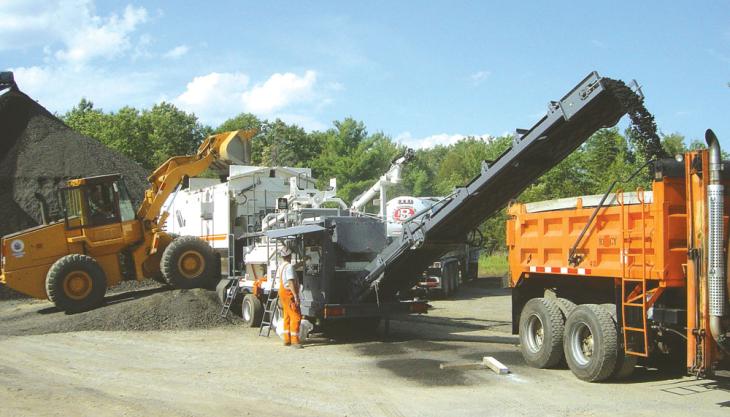A mixing plant that comes to the job site

According to Wirtgen, the KMA 200 sets a high standard when it comes to the performance, efficiency and quality of cold-recycling mixing plants. Its mobile concept turns the KMA 200 into a transportable production plant and allows the user to benefit from its technological innovations and versatility in a variety of operations. Owing to its tried and tested microprocessor control system, the KMA can produce mixes either in batch mode, with subsequent loading on to trucks, or in continuous mode for subsequent stockpiling.
Regardless of the location of the project, Wirtgen say the capabilities of the machine have been proven time and again in many applications around the world, including a recycled RAP demonstration project in Richmond, Maine.
As in most states in the US, Maine has accumulated significant quantities of RAP, most of which is stockpiled in various locations. Recognizing the value of these stockpiles as a source of high-quality material, Maine has an established recycling programme.
In order to expand this programme, Maine’s Department of Transport, in association with Wirtgen America Inc., set up a demonstration project to recycle RAP and stabilize it with foamed bitumen using a Wirtgen KMA 200 cold-mix plant. The objectives of the demonstration were: to evaluate the versatility and mobility of the KMA 200 plant; to evaluate foam-mix RAP as a flexible base material; and to evaluate the feasibility of storing foam mix RAP in a stockpile.
The RAP stockpile chosen for the demonstration project was found to be in reasonable to good condition; ie there was not too much evidence of large ‘chunks’ of asphalt. In this condition it was considered unnecessary to use a crusher as a simple screen would be sufficient. Using the Wirtgen WLB 10 foam lab, the following optimum mix design was determined: 2.2 % foamed bitumen (64-28 asphalt) at 170°C (338°F); 2.5 % foam water (expansion water); and 2.0– 2.5 % compaction moisture.
The demonstration was scheduled for three days; each day 30 tonnes of 64–28 asphalt would be delivered to site with an appropriate tonnage of RAP being recycled each day. The foam-mix RAP recycling process comprised:
The KMA 200 plant proved to be extremely mobile; the unit was set up directly adjacent to the RAP site, thereby greatly reducing the material handling time and number of loaders required. The recycled RAP mixed with foamed bitumen proved to be an easy material to work with, and laying with a conventional asphalt paver presented no problems.
Foam-mix RAP offers an economical option to conventional flexible base material. Although the foam mix RAP used on this project was stockpiled for just one week, the mix can be stored for up to three months in the climate that Maine experiences. This ability to store the processed material is of great benefit to maintenance engineers when planning projects.
For more information about the KMA 200 contact Phil Higginson, general manager – road technologies, on tel: (07836) 362818.
Regardless of the location of the project, Wirtgen say the capabilities of the machine have been proven time and again in many applications around the world, including a recycled RAP demonstration project in Richmond, Maine.
As in most states in the US, Maine has accumulated significant quantities of RAP, most of which is stockpiled in various locations. Recognizing the value of these stockpiles as a source of high-quality material, Maine has an established recycling programme.
In order to expand this programme, Maine’s Department of Transport, in association with Wirtgen America Inc., set up a demonstration project to recycle RAP and stabilize it with foamed bitumen using a Wirtgen KMA 200 cold-mix plant. The objectives of the demonstration were: to evaluate the versatility and mobility of the KMA 200 plant; to evaluate foam-mix RAP as a flexible base material; and to evaluate the feasibility of storing foam mix RAP in a stockpile.
The RAP stockpile chosen for the demonstration project was found to be in reasonable to good condition; ie there was not too much evidence of large ‘chunks’ of asphalt. In this condition it was considered unnecessary to use a crusher as a simple screen would be sufficient. Using the Wirtgen WLB 10 foam lab, the following optimum mix design was determined: 2.2 % foamed bitumen (64-28 asphalt) at 170°C (338°F); 2.5 % foam water (expansion water); and 2.0– 2.5 % compaction moisture.
The demonstration was scheduled for three days; each day 30 tonnes of 64–28 asphalt would be delivered to site with an appropriate tonnage of RAP being recycled each day. The foam-mix RAP recycling process comprised:
- positioning the KMA 200
- screening the RAP
- processing the RAP through the KMA 200
- loading foam-mix RAP
- daily production
- stockpiling foam-mix RAP
- laying foam-mix RAP
The KMA 200 plant proved to be extremely mobile; the unit was set up directly adjacent to the RAP site, thereby greatly reducing the material handling time and number of loaders required. The recycled RAP mixed with foamed bitumen proved to be an easy material to work with, and laying with a conventional asphalt paver presented no problems.
Foam-mix RAP offers an economical option to conventional flexible base material. Although the foam mix RAP used on this project was stockpiled for just one week, the mix can be stored for up to three months in the climate that Maine experiences. This ability to store the processed material is of great benefit to maintenance engineers when planning projects.
For more information about the KMA 200 contact Phil Higginson, general manager – road technologies, on tel: (07836) 362818.


